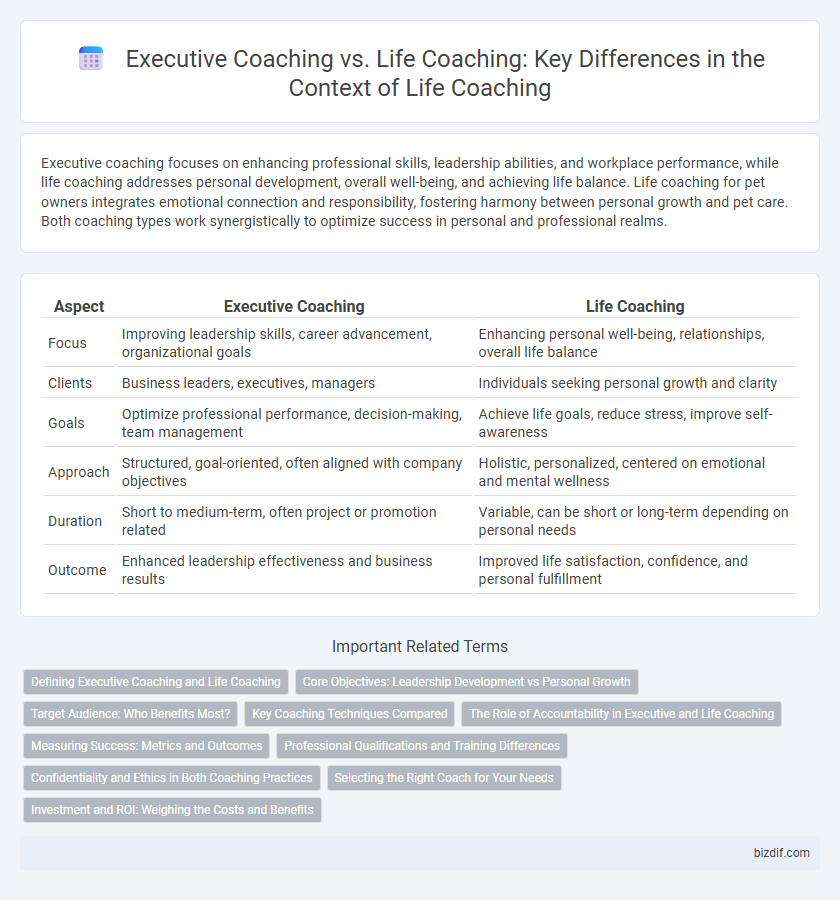Executive coaching focuses on enhancing professional skills, leadership abilities, and workplace performance, while life coaching addresses personal development, overall well-being, and achieving life balance. Life coaching for pet owners integrates emotional connection and responsibility, fostering harmony between personal growth and pet care. Both coaching types work synergistically to optimize success in personal and professional realms.
Table of Comparison
| Aspect | Executive Coaching | Life Coaching |
|---|---|---|
| Focus | Improving leadership skills, career advancement, organizational goals | Enhancing personal well-being, relationships, overall life balance |
| Clients | Business leaders, executives, managers | Individuals seeking personal growth and clarity |
| Goals | Optimize professional performance, decision-making, team management | Achieve life goals, reduce stress, improve self-awareness |
| Approach | Structured, goal-oriented, often aligned with company objectives | Holistic, personalized, centered on emotional and mental wellness |
| Duration | Short to medium-term, often project or promotion related | Variable, can be short or long-term depending on personal needs |
| Outcome | Enhanced leadership effectiveness and business results | Improved life satisfaction, confidence, and personal fulfillment |
Defining Executive Coaching and Life Coaching
Executive coaching is a specialized form of professional development focusing on enhancing leadership skills, strategic thinking, and organizational performance for business leaders and executives. Life coaching centers on personal growth, emotional well-being, and achieving individual life goals by addressing areas such as relationships, health, and work-life balance. Both coaching types utilize tailored strategies but differ primarily in their target outcomes--executive coaching drives career advancement and business impact, while life coaching promotes overall personal fulfillment.
Core Objectives: Leadership Development vs Personal Growth
Executive coaching targets leadership development by enhancing strategic decision-making, communication skills, and organizational influence for business leaders. Life coaching centers on personal growth, emphasizing self-awareness, emotional well-being, and goal-setting to improve overall life satisfaction. Both coaching types foster transformation but address distinct aspects of an individual's professional and personal journey.
Target Audience: Who Benefits Most?
Executive coaching primarily benefits business leaders, managers, and professionals aiming to enhance leadership skills, decision-making, and organizational performance. Life coaching targets individuals seeking personal growth, improved relationships, and work-life balance across various life domains. Both coaching types deliver tailored strategies, but the executive focus aligns with career advancement while life coaching supports holistic self-improvement.
Key Coaching Techniques Compared
Executive coaching emphasizes goal-oriented strategies such as performance assessment, leadership development, and behavioral feedback to enhance workplace effectiveness. Life coaching primarily utilizes techniques like values clarification, emotional intelligence building, and habit transformation to foster personal growth and well-being. Both coaching styles integrate active listening, powerful questioning, and accountability frameworks to drive client progress and achieve tailored outcomes.
The Role of Accountability in Executive and Life Coaching
Accountability in executive coaching centers on enhancing leadership performance and achieving organizational goals through measurable outcomes and strategic action plans. In life coaching, accountability emphasizes personal growth, habit formation, and emotional well-being by fostering self-awareness and consistent progress toward individual aspirations. Both coaching types use accountability structures, but executive coaching aligns targets with business metrics, while life coaching prioritizes holistic development and balanced life choices.
Measuring Success: Metrics and Outcomes
Measuring success in executive coaching typically centers on performance metrics such as improved leadership effectiveness, enhanced decision-making, and tangible business outcomes like increased revenue or team productivity. Life coaching success is often evaluated through personal growth indicators, including improved emotional well-being, goal achievement, and better work-life balance. Both coaching types utilize client feedback and progress tracking tools to quantitatively and qualitatively assess outcomes tailored to individual objectives.
Professional Qualifications and Training Differences
Executive coaching requires specialized training in leadership development, organizational behavior, and business strategy, often involving certifications such as the International Coach Federation (ICF) PCC or MCC credentials. Life coaching emphasizes broader personal growth skills, including emotional intelligence, goal setting, and work-life balance, with certifications like Certified Life Coach (CLC) or Professional Certified Coach (PCC). The distinct professional qualifications reflect the tailored focus of executive coaching on corporate performance and the holistic personal development approach in life coaching.
Confidentiality and Ethics in Both Coaching Practices
Executive coaching and life coaching both prioritize confidentiality and adhere to strict ethical guidelines established by professional bodies such as the International Coach Federation (ICF). Confidentiality in executive coaching is critical due to the involvement of corporate environments, sensitive business strategies, and hierarchical relationships, necessitating clear agreements on information sharing. Life coaching emphasizes client trust through ethical practices that protect personal information and foster a safe space for personal growth and self-discovery.
Selecting the Right Coach for Your Needs
Executive coaching targets leadership skills, strategic decision-making, and professional growth, ideal for corporate executives aiming to enhance performance in the workplace. Life coaching focuses on personal development, goal-setting, and overcoming obstacles in various life areas, suited for individuals seeking overall life balance and fulfillment. Selecting the right coach requires assessing your specific objectives, whether career advancement or personal transformation, and evaluating the coach's expertise, methods, and success stories relevant to those goals.
Investment and ROI: Weighing the Costs and Benefits
Executive coaching typically involves higher financial investment due to its targeted focus on leadership skills and organizational impact, often yielding measurable ROI through improved team performance and strategic outcomes. Life coaching generally requires a lower monetary commitment but emphasizes personal development, work-life balance, and emotional well-being, which can lead to long-term benefits in overall happiness and productivity. Evaluating the costs against the specific goals and desired returns helps clients choose the appropriate coaching approach for maximum value.
Executive coaching vs Life coaching Infographic

 bizdif.com
bizdif.com